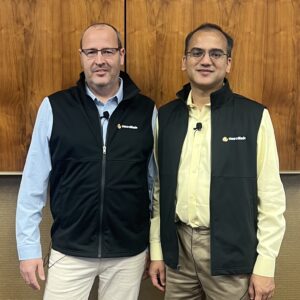|
|
 Mordi Blaunstein and Krishna Maheshwari of NeuroBlade presented at Cloud Field Day 19 |
This Presentation date is January 31, 2024 at 8:00-9:30.
Presenters: Elad Sity, Krishna Maheshwari, Mordi Blaunstein
Delegate Panel: Andrew Brust, Sanjeev Mohan
Revolutionizing Big Data Analytics with NeuroBlade’s SQL Processing Unit (SPU)
Watch on YouTube
Watch on Vimeo
Elad Sity leads a deep dive into the future of big data analytics with the unveiling of NeuroBlade’s SQL Processing Unit (SPU). This presentation highlights how the SPU is a cornerstone technology for data analytics acceleration, offering rapid and scalable processing capabilities that transform big data into actionable insights. Discover NeuroBlade’s role in advancing big data analytics, making it more accessible through partnerships that enhance market adoption.
Elad Sity, CEO of NeuroBlade, presents an overview of his company, which was founded in 2018 with the aim to revolutionize data processing. NeuroBlade has grown to over 120 employees and raised over $100 million. The company has a presence in Tel Aviv, Israel, and Palo Alto, California. They are focused on accelerating big data analytics, specifically targeting the acceleration of SQL queries and data lookups. NeuroBlade’s SQL processing unit (SPU) is designed to run data analytics more efficiently, boasting performance improvements up to 30x with a third of the cost.
NeuroBlade’s SPU is an accelerator built specifically for data analytics and is not a CPU or GPU. It integrates with existing analytics engines that customers already use, such as Spark, Presto, and ClickHouse, through a software layer and API. The SPU is designed for modern cloud environments and supports containerized workloads but not virtualized ones currently. It is also optimized for structured data analytics.
The company has partnered with Dell to offer the SPU in PowerEdge servers for enterprise customers, while hyperscale customers can integrate the SPU card into their own server designs. NeuroBlade has conducted benchmarks showing significant performance improvements, such as reducing query times from minutes to seconds.
The presentation includes a Q&A session where Elad addresses questions about the SPU’s integration with query optimizers, its support for containerization, its focus on structured data, and its ease of integration with customers’ existing infrastructure and analytics engines. He clarifies that while they are not currently targeting traditional RDBMS platforms like Oracle or SQL Server, they are open to working with such vendors in the future.
Personnel: Elad Sity
Harnessing Acceleration for Future-Proof Big Data Analytics with NeuroBlade
Watch on YouTube
Watch on Vimeo
Mordechai Blaunstein discusses the critical need for data analytics acceleration within the big data analytics sphere. By showcasing NeuroBlade’s SQL Processing Unit (SPU), he demonstrates its effectiveness in enhancing the speed and scale of big data processing. Attendees can gain insights into the latest trends that are defining the big data analytics landscape, including Data Lake architecture and open standards, and learn how NeuroBlade is addressing the demand for rapid data analytics acceleration in data centers.
Blaunstein emphasizes the exponential growth of data and the associated challenges such as compute, networking, storage, energy, space, and software. He outlines the market trends that influenced their solution, including the shift towards Data Lake and Data Lakehouse architectures, the need for rapid data analytics in the cloud, and the adoption of open standards.
Blaunstein explains that traditional CPUs cannot efficiently scale to meet the demands of big data analytics, and while GPUs offer better performance, they come with high costs and limited availability. NeuroBlade’s SPU is presented as a purpose-built accelerator for data analytics, designed to enhance performance without exorbitant costs.
The SPU can be integrated into existing software ecosystems and supports common workloads like Spark, Presto, and Clickhouse. It is offered as a PCIe card for easy integration into servers. Blaunstein mentions that the SPU is particularly suited for large enterprises with significant data that cannot be moved to the cloud due to regulatory or other constraints.
Questions from the audience address topics such as the SPU’s target market, competition with other accelerators, integration with analytical layers, licensing, and open-source availability of the software SDK and API. Blaunstein clarifies that the SPU is optimized for one card per server, as it already fully utilizes the server’s I/O capabilities, and that sharding is handled by the data analytics tools above NeuroBlade’s layer.
Personnel: Mordi Blaunstein









